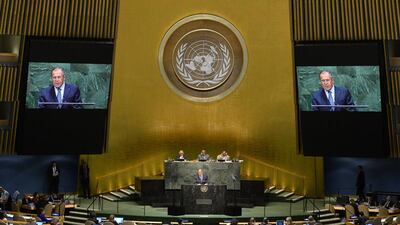Sergei Lavrov, Russia’s impressively single-minded foreign minister, has long been known for not mincing his words. But his speech to the UN General Assembly last week was blunt, even by his standards. Pretty much every action western countries have taken of late he condemned as being hypocritical and self-serving. “The US-led western alliance, while acting as an advocate of democracy, rule of law and human rights,” he said, “is acting from the opposite position, rejecting the democratic principle of the sovereign right of states enshrined in the UN Charter and trying to decide for others what is good and what is bad.”
Some will dismiss Mr Lavrov as simply being a conduit for “His Master’s Voice”. While he may well be a dutiful minister to Vladimir Putin, Mr Lavrov is, however, no stooge but a highly-experienced diplomat who was Russia’s ambassador to the UN for 10 years and has served another decade in his current position. Moreover, it would be unwise to assume the country’s leadership is merely suffering from a fit of pique and that their views do not chime with the vast majority of ordinary Russians.
In fact, Mr Lavrov’s bracing argument reflects a narrative that has serious currency back home in a land where they see Nato encroaching on their borders in states that were either once Soviet satellites or parts of the Russian empire, and where many share the foreign minister’s ire at what he called US claims to “eternal uniqueness”. Many, perhaps most, Russians, observe the same events in, say, Ukraine, as do those in the West, and yet draw entirely different conclusions. Such narratives matter because they are genuine expressions of perceptions of geopolitical realities. They do not disappear just because some think – and assume everyone else will think – that they are wrong-headed.
But this is true of narratives in general, a point that is obscured by claims to impartiality that are policed by the very people making those claims. The New York Times, for instance, is a fine paper, but it does not approach the news as a tabula rasa. It has a definite world view, a narrative and a series of assumptions. “In general, The Times has enforced a strict definition of impartiality,” wrote its public editor, Margaret Sullivan last year.
But if you ask a Qatari, whose capital, Doha, was described as “Club Med for Terrorists” in a recent NYT op-ed, if they feel the paper covers their country impartially and I suspect the response might be rather heated.
Narratives can and are created, and often later disputed. In this, the centennial anniversary of the outbreak of the First World War, there has been much debate about questions including whether Europe sleepwalked to continental conflagration, if German aggression was mainly to blame, or whether – as was still being taught when I was a schoolboy – the efficiency and rigidity of Teutonic railway timetables was such that once troops had been despatched hostilities were inevitable.
Then there are those, most famously the award-winning Australian journalist and broadcaster John Pilger, who maintain that western populations have been “hoodwinked” by government propaganda into accepting entirely false narratives about many of the military adventures of the last century, from the Great War to the invasion of Iraq, during which, he has written, the fall of Basra was reported by BBC News 24 “17 times”.
His ally, the celebrated American academic Noam Chomsky believes that: “If the Nuremberg laws were applied, then every post-war American president would have been hanged” for crimes including invading foreign countries, overthrowing their governments and supporting “near genocide”. That his suggestion is regarded as outlandish, “nutty” by some, he would argue, is the result of the media’s collusion in “manufacturing consent” on behalf of the dominant economic system. In short, a great deal of 20th century history is basically deceits that have been perpetrated by western leaders and then accepted as the truth by the vast majority.
We recognise the importance of narrative when it is acknowledged that the US involvement against ISIL must not end up being seen as one of invasion or the removal of agency from local peoples. And Syria provides another example of how narrative can not only represent a view of the facts but also shape them going forward. In one of the essays in the recently published On the Ground: New directions in Middle East and North African studies, Northwestern University’s Elizabeth Shakman Hurd argues that “when the media, government officials and public figures frame the revolt not as a popular uprising against a secular autocracy, but as an armed sectarian conflict pitting Sunnis against Alawites and their Shiite allies, it hardens lines of religious difference. It brings these lines to the surface, accentuates and aggravates them”.
This is, as she writes, “the regime’s story”. But it is also that of those US actors who are focused on the fate of religious, primarily Christian, minorities instead of the Syrian people as a whole. Concludes Shakman Hurd: “This makes sectarian violence more, rather than less likely”.
So it would be a mistake to dismiss Mr Lavrov’s speech as mere propaganda. And 100 years after a Serbian nationalist’s shooting of the heir to the Austro-Hungarian emperor ignited Europe, Mr Lavrov’s even more recent comments that Nato expansion in the Balkans would be “a provocation” should not be taken lightly, either. Russia’s narrative counts, certainly to itself – and the same applies to other countries. To recognise that is not to agree with the narratives in question. Acknowledging their weight, however, is a necessary step towards stabilising what Mr Lavrov correctly called the coming “polycentric” world order.
Sholto Byrnes is a Doha-based commentator and consultant


